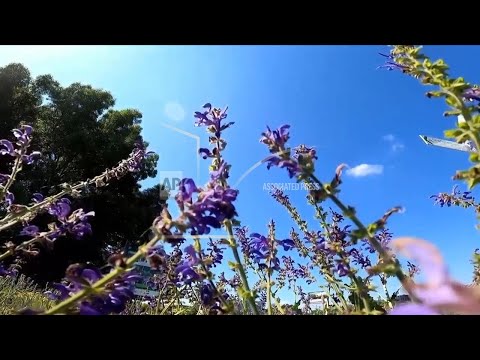(20 May 2025)
RESTRICTION SUMMARY:
ASSOCIATED PRESS
Berlin – 20 May 2025
1. Close of bees pollinating flowers
ASSOCIATED PRESS
Cologne – 20 May 2025
2. Mid of a beekeeper inspecting hive
3. Close of beekeeper inspecting frame
4. SOUNDBITE (German) Matthias Roth, 63, chairman of the Cologne Beekeepers Association:
"We must take care of nature. We have become far removed from nature, especially in cities, and we must take care of wild bees in particular. This is a very, very important component. It is now threatened in many ways by the invasive species of Asian hornets, for example, but also by missing habitats, missing flowers blooming and the right soil, in which most solitary living wild bees ultimately also reside."
5, Beekeeper handling bees
6. Mid of beehives
7. Various of bees entering and exiting hive
ASSOCIATED PRESS
Berlin – 20 May 2025
8. Various of bees pollinating flowers
STORYLINE:
On the eighth annual “World Bee Day,” around 400,000 bees in urban rooftop hives in Cologne, Germany, were busy at work making honey.
They seemed oblivious to the threats that endanger their survival. Scientists and bee experts hope Tuesday’s World Bee Day can raise awareness.
For Matthias Roth, chairman of the Cologne Beekeepers Association, it’s crucial to protect both honey bees — like the ones in his rooftop hives — and wild species. His organization has set up nesting boxes in the hopes of helping solitary bees, which don’t form hives, but Roth fears that it’s not enough.
“We must take care of nature,” Roth said Tuesday. “We have become far removed from nature, especially in cities, and we must take care of wild bees in particular.”
Bees and other pollinators have been on the decline for years, and experts blame a combination of factors: insecticides, parasites, disease, climate change and lack of a diverse food supply.
A significant part of the human diet comes from plants pollinated by bees — not just honeybees, but hundreds of species of lesser-known wild bees, many of which are endangered.
In 2018, the U.N. General Assembly sponsored the first “World Bee Day” to bring attention to the bees’ plight.
Steps as small as planting a pollinator garden or buying raw honey from local farmers were encouraged.
May 20 was chosen for “World Bee Day” to coincide with the birthday of Anton Janša, an 18th century pioneer in modern beekeeping techniques in his native Slovenia.
In Germany, bees contribute 2 billion euros ($2.3 billion) in economic benefits, they’re key to pollinating the iconic yellow rapeseed fields that dominate the countryside in the spring.
AP video shot by: Fanny Brodersen and Daniel Niemann
===========================================================
Clients are reminded to adhere to all listed restrictions and to check the terms of their licence agreements. For further assistance, please contact the AP Archive on: Tel +44(0)2074827482 Email: info@aparchive.com.
Find out more about AP Archive: http://www.aparchive.com/HowWeWork
Twitter: https://twitter.com/AP_Archive
Facebook: https://www.facebook.com/APArchives
Instagram: https://www.instagram.com/APNews/
You can license this story through AP Archive: http://www.aparchive.com/metadata/youtube/93f150bf87654865819522254478dba7
Author: AP Archive
Go to Source
News post in May 25, 2025, 3:08 pm.
Visit Our Sponsor’s:
News Post In – News





